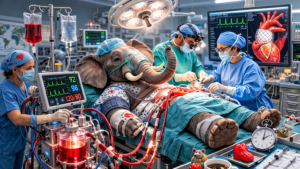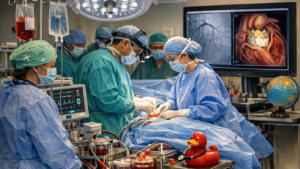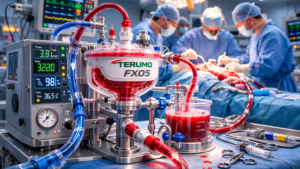Cardiogenic shock following cardiac surgery is a life-threatening condition affecting 2–6% of patients. While MCS devices like venoarterial extracorporeal membrane oxygenation (VA-ECMO) and micro-axial flow pumps provide temporary cardiac support, their implementation and timing remain debated. Traditional MCS use follows a sequential recovery model, prioritizing cardiac recovery over systemic stabilization. However, emerging evidence suggests that parallel recovery, which concurrently supports cardiac and systemic functions, may improve patient outcomes.
Key Findings from Recent Studies:
- DanGer Shock Trial (2024):
- Compared standard care versus micro-axial flow pumps in STEMI-related cardiogenic shock.
- Significantly lower 180-day mortality in the MCS group.
- Early MCS intervention reduced organ failure and improved cardiac recovery.
- Postcardiotomy MCS (Mariani et al., 2023):
- Examined 2058 cardiac surgery patients requiring MCS.
- In-hospital mortality was 60.1%, but 76.4% of survivors lived past 10 years.
- Suggested potential benefits but highlighted complications like bleeding, infection, and hemolysis.
- Early LV Decompression and Hemodynamic Stabilization:
- Left ventricular (LV) unloading during MCS reduced myocardial oxygen demand.
- Patients with early micro-axial flow pump support had lower vasopressor needs.
- Faster lactate clearance indicated improved end-organ perfusion.
- Complications and Challenges:
- VA-ECMO alone can increase left ventricular afterload, worsening myocardial stress.
- Hemolysis and acute kidney injury (AKI) were noted, particularly with high-power Impella CP devices.
- Underrecognized right ventricular (RV) dysfunction may contribute to renal failure.
Transitioning from Sequential to Parallel Recovery:
The traditional MCS approach focuses on stabilizing cardiac function before addressing systemic recovery. However, parallel recovery strategies are gaining traction by allowing:
- Earlier extubation and mobilization while the heart recovers.
- Tunneled axillary/aortic grafts for device implantation, enabling faster weaning from mechanical ventilation.
- Proactive Impella 5.5 use, reducing the need for prolonged VA-ECMO.
Clinical Implications and Future Research:
- Early MCS application may improve post-cardiotomy outcomes but requires better patient selection.
- The IMPACT trial is currently investigating prophylactic Impella 5.5 implantation in high-risk cardiac surgery patients.
- Future randomized trials should assess optimal device selection, insertion timing, and LV unloading benefits.
Conclusion:
The evolution from sequential to parallel recovery in perioperative MCS represents a shift in cardiac surgery care. While early intervention shows promise, managing complications like hemolysis and renal dysfunction remains a challenge. Research into tailored MCS strategies will be crucial in optimizing patient survival and recovery in high-risk surgical populations.
Scientific Article Ranking (8 of 10)







